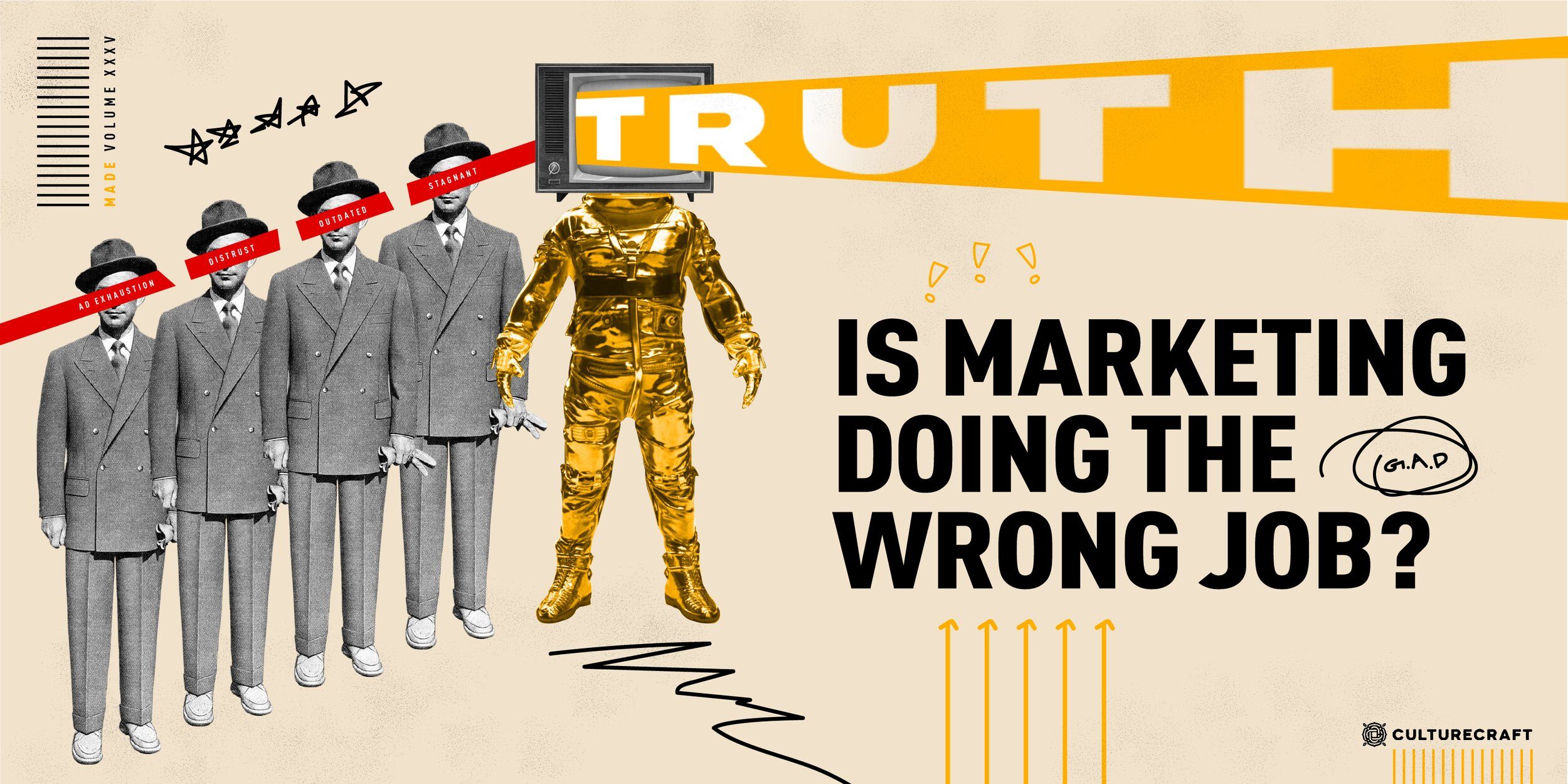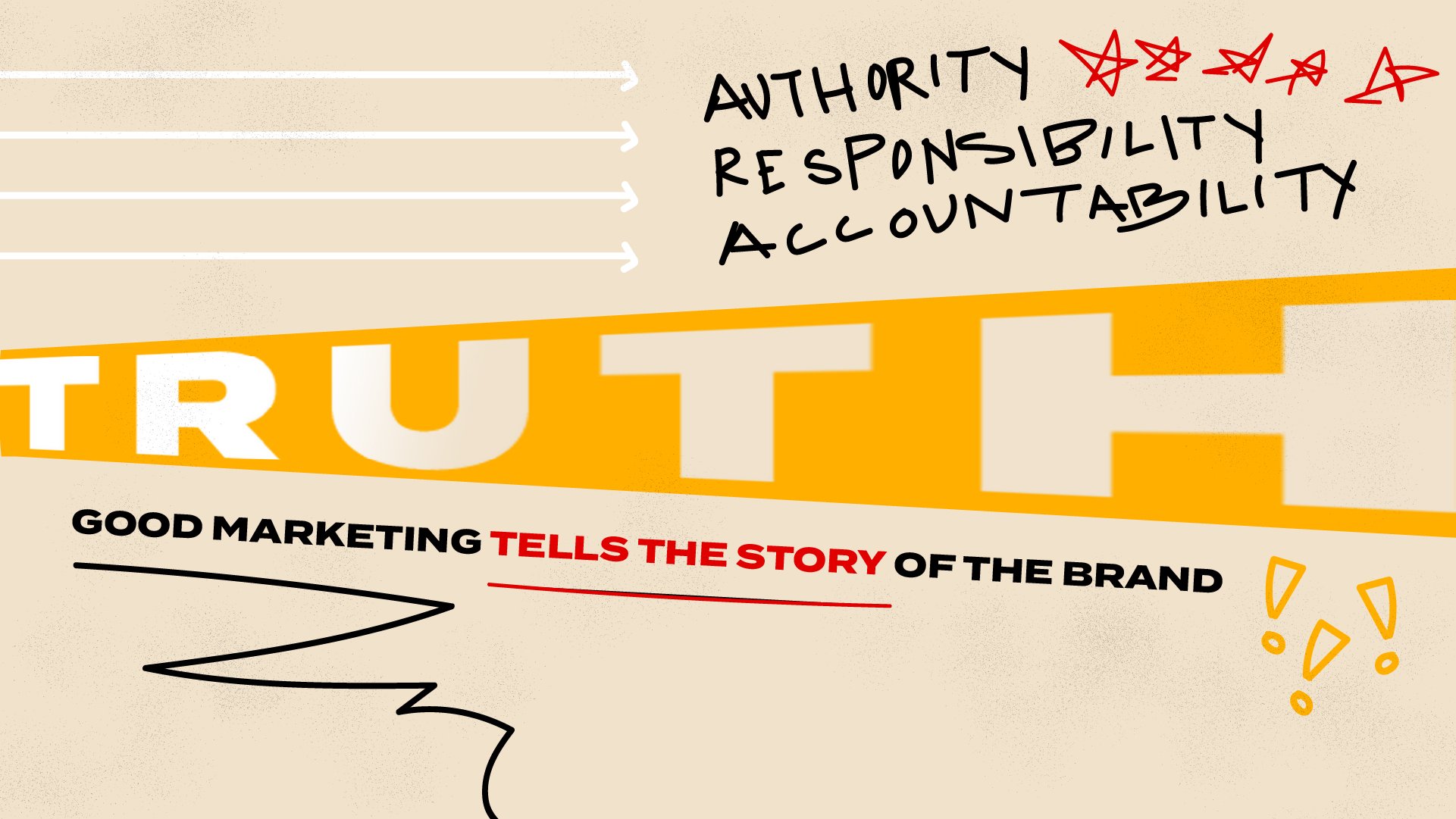What Should The Marketing Department Be Doing?
While slightly nebulous when read as a child, the primary lesson of Goldilocks and The Three Bears as an adult could be summed up like this: some things fit exactly as they’re supposed to. And when they don’t…
Shit breaks.
Maybe you’ve noticed, or maybe you haven’t, but marketers and marketing teams have been doing the wrong job for a while now. In some cases, it’s because they were grandfathered into a broken system, other times it’s because they didn’t know how to advocate for the right one.
Either way, the universe of commerce ended up with a lot of broken shit as a result: increased customer distrust, ad exhaustion, mis-aligned and miscommunicating internal teams, brands flattening and failing, and much horrible more.
CEOs and others looking to Give A Damn and up level their brands in the Emerging Economy can no longer ignore it. When the marketing department does the wrong job, the other departments will underperform. When the marketing department does the right job, the brand flourishes.
To begin, let’s start with how so many marketers found themselves in front of the wrong bowl of porridge.
Marketers In The Wrong Jobs
In the way-way back, marketers held a coveted role as encyclopedias on their brand’s customers, with a direct line to their needs, wants, and priorities.
And then the internet happened, and scores of executives (some of them marketers themselves) began to utilize the new digital space like a giant billboard. Instead of doing the hard work of knowing their customers, they hired “marketers” to follow them around the internet, chasing clicks, and occasionally cranking buying pressure up a few notches to match sales quotas.
Slowly but surely these marketers, now somehow beholden to the sales department, transitioned from being in the business of customer knowledge, to the business of pre-sales, relying on the newest mar-tech to keep up with the demand from the C-suite. Marketing lost its genuineness, its credibility. It didn’t matter anymore what was being said as long as a piece of technology could get it in front of the eyeballs and twitchy index fingers of a buyer somewhere.
The digital age made it possible to reach more people than was ever before possible. And many businesses and leaders (including marketers) failed to see more than a dramatically larger pool of potential customers who could be turned into a dramatically larger pool of actual customers if just the right inundation of buying opportunities was presented.
Marketers were asked to do the wrong job, and they did it, right up until the funnels went dark, the privacy walls went up, and the age of attribution slipped silently into the nevermore.
Marketers In The Right Jobs
Now, let’s dispense with the doom and gloom. Yesterday’s mistakes remain yesterday’s, lest we refuse to leave them there.
So what job should marketers be doing today, how should they work with other departments, and how do you make it happen? Let’s start at the top.
The real job of marketing is to highlight the brand’s reputation.
Remember that brand is actionable reputation. The better the reputation, the more value the brand holds. So, all those Facebook ads we were running ten years ago…yeah, that did no one’s reputation any good. Good thing there’s today.
When the marketing department, which paves the way for the brand’s reputation to exist, does its job well – every other department sees its job get easier and easier.
As an example, no one has to convince you to buy a Tom Ford suit, a Patagonia vest, an Omega Speedmaster, or tickets to Disney World. The reputation of these brands is not in question. Their marketing departments are highly devoted to connecting their customer’s specific wants and needs to the story of their brands.
As our own Nick Ritchsmeier writes in his upcoming book,
“Marketing creates a conversation between a community of people with shared needs and a community of people with shared value. Any tool that facilitates that conversation is marketing. The substance of that conversation is brand.”
When marketing tells the truthful, customer-centric story of its brand, it’s working just as it should and just where it should in relation to other departments.
Speaking of which – lets pause for a moment to see marketing’s true place in an organization.
As we’ve discussed, marketing is not in pre-sales. Their job is not to warm up a customer so a salesman can swoop in and close the deal. Marketing, wielded in this way is often gaudy, shallow, and smelly. Customers can see the fumes coming off it, see the salesman incoming, and will immediately start looking for the door, the brand’s reputation to forever be held in low esteem.
In the truest sense, sales is actually a form of marketing. So are advertisements. So is social media. So are the chocolates lovingly placed on the pillows at your favorite hotel. So are emails.
If it lends to the conversation about the reputation of your brand, and specifically whether that reputation is based in the love and care of your customer, it’s marketing, friend.
In the post-attribution, highly digitized age, marketing should not take a lower place in the organizational structure. It should actually be elevated to its true role, as the pulse mirroring the heartbeat of your very brand.
The 3 Things Needed To Make Marketing Thrive
How marketers do their jobs, depends greatly on the tools they’re given by their employers. So we want to leave you with three elements every marketing department needs to thrive, and how best to manage them if you’re in the C-suite.
1. Authority: Too often, marketing departments and marketers find themselves handcuffed by those in leadership. If you hire a marketer and have hired them for the right job discussed above, then the first thing they need is authority to make decisions and give insight, not simply aesthetically, but on a strategic whole. Without it, marketing doesn’t get to serve its proper function and simply becomes a factory for “making things prettier.”
2. Responsibility: Along with authority, marketers should feel a sense of ownership over the brand. In a good marketer, this sense of responsibility helps to deepen their quality of work, as well as empowering them to become a better team player.
3. Accountability: With greater authority and responsibility, should come greater accountability. Owners may fear that without attribution, there’s no way to keep marketers accountable. But marketers should be accountable to other metrics like:
· Customer\Lifetime Value
· Retention
· Opportunity Velocity
· Revenue Churn Rate
· Repeat Purchase Ratio
· Net Promoter Score
Marketing’s job is to move people – the accountability, and measurements that reflect it, should be focused on that.
What’s A CEO To Do?
Let us be clear: breaking the dependance on attribution and other performance based marketing habits belies a process that will not happen overnight. In our experience, it’s taken clients somewhere in the ballpark of 2-3 years to completely overhaul their marketing departments so that they’re serving the correct function for and within the brand.
But there is no way to build a great brand when the marketing is doing the wrong job. You don’t need to fix your funnels, there is no better piece of mar-tech that is going to set it straight. The issue is down to the core. And the first step in correcting any bad habit, is admitting that it is indeed a bad habit and needs to be stopped.
And after you’ve done, then you must be willing to enlist some wisdom and expertise that surpasses your own. After all, as they say, “You’re best thinking got you here. You’ll need someone else’s to get out.”
There are lots of ways to go about enlisting the help of experts who can aid in getting your marketing on the right track. For instance:
· Need to focus more on marketing tactics, like a switch from lead gen to demand gen: Refine Labs will help you nail it.
· Need a quick diagnostic that will help you up-level your website or communications: Martin Creative has an incredible diagnostic tool with immediate applications.
· Need thought leadership, some truly insightful takes on current state of branding, marketing, and communication: Scott Galloway and Brand Sprint will fill your hopper with fresh ideas.
Need more than something short term, or ready to take on the whole thing from a systemic level?
Then it’s time to book a call.



